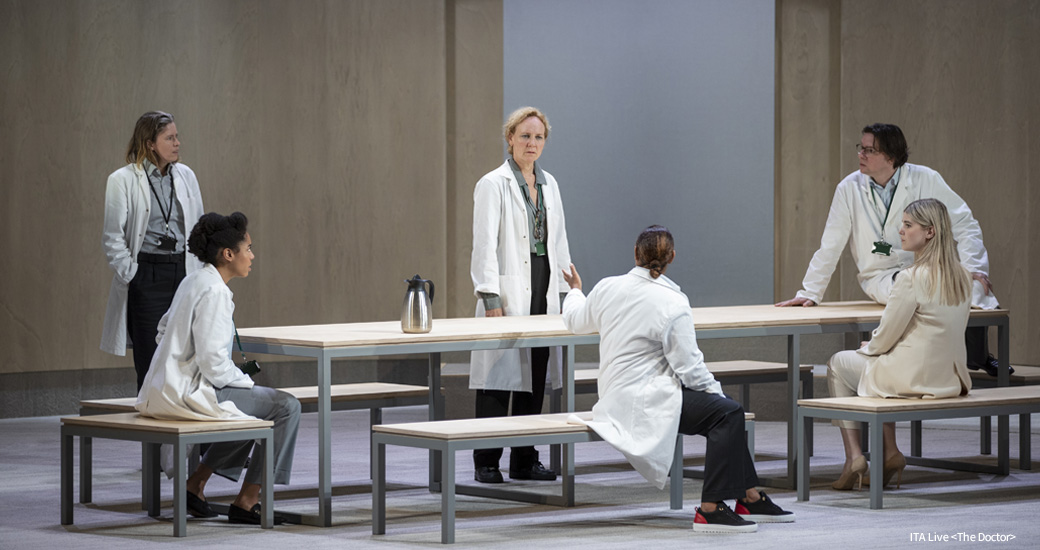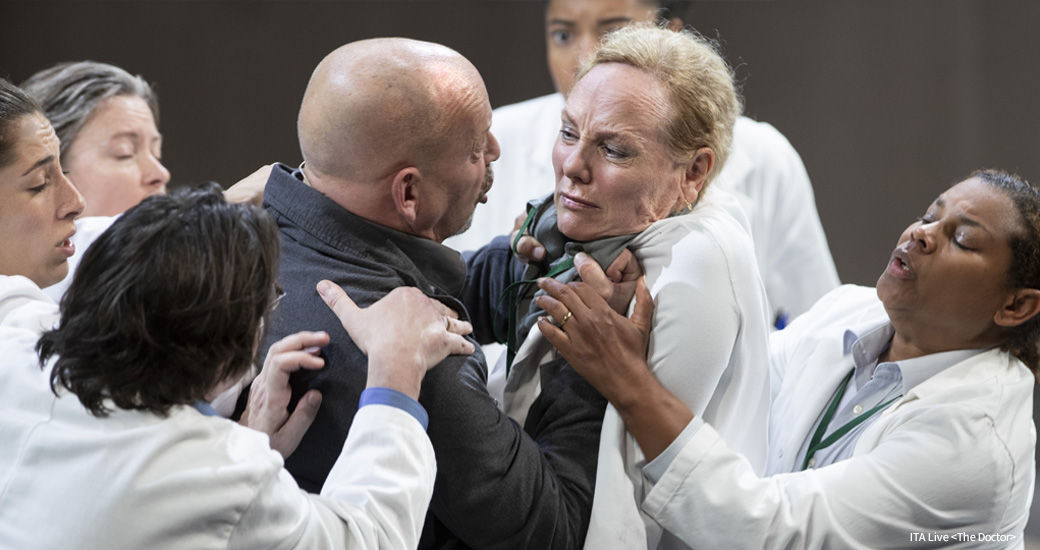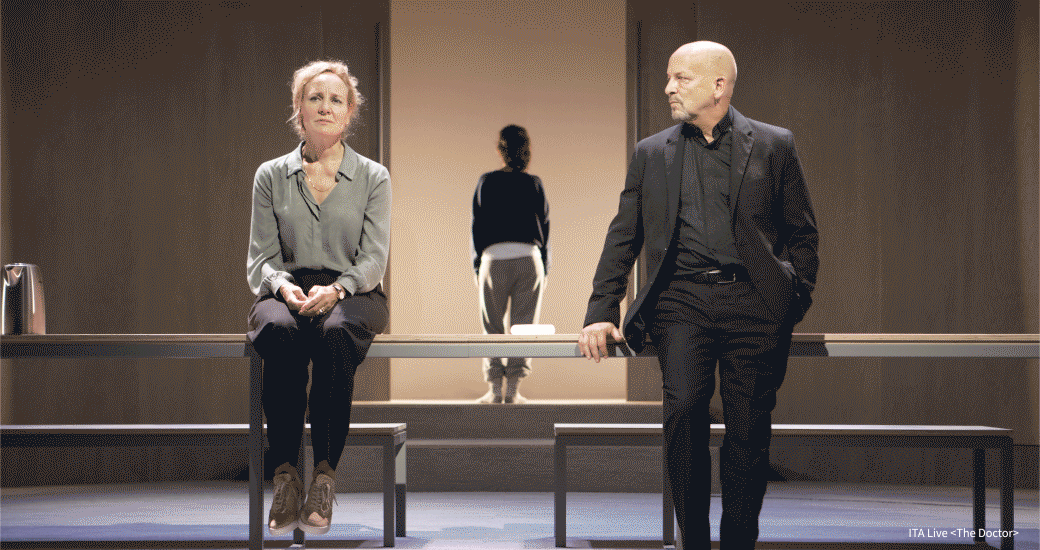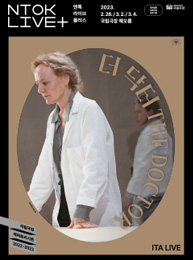내일의 전통, 오늘의 관객을 만나다
월간국립극장
-
내일의 전통 SPOTLIGHT 더보기
-
무대, 탐미 STAGES 더보기
- 미리보기, 하나 - 국립극장 기획공연 <나는 재미있는 낙타예요> 구음과 판소리가 펼쳐낼 감각의 스펙트럼
- 미리보기, 둘 - 가치 만드는 국립극장 국립창극단 <작창가 프로젝트> 시연회 판소리를 위한 헌정곡
- 미리보기, 셋 - 국립무용단 <묵향> 고전으로 꽃피운 명작
- 미리보기, 넷 - 국립국악관현악단 <2023 윈터 콘서트> 색다른 만남
- 미리보기, 다섯 - 파크컴퍼니 <고도를 기다리며> 저녁의 게임, 기다림의 규칙
- 미리보기, 여섯 - 국립극장 기획공연 <세종의 노래 : 월인천강지곡> 세 가지 시선: 거장들의 만남
- 미리보기, 일곱 - 국립극장 <송년판소리> 세말에도 덩실덩실
-
안목의 성장 INSIGHT 더보기
-
극장 속으로 INTO THEATER 더보기

연출가이자 작가인 로버트 아이크는 고전을 현대화하는 데 전문가다. 헨리크 입센의 <들오리>를 각색한 버전이 방자하리만큼 당돌한 시각으로 충격을 줬다면, 아르투어 슈니츨러의 <베른하르디 교수>를 각색한 <더 닥터>는 원작의 주제를 탁월하게 확장한다. 또한 작품에서 주연을 맡은 줄리엣 스티븐슨은 올해 연극계 최고로 손꼽힐 만한 절정의 연기를 보여준다.
1912년 초연된 슈니츨러의 희곡은 세기 전환기 빈에서 고조된 반(反)유대주의의 양상을 통렬하게 그려 논란을 일으켰다. <베른하르디 교수>의 주인공인 유대인 의사는 죽음을 앞둔 환자에게 병자성사를 하려는 가톨릭 사제를 거부했다가 병원 안팎에서 공격당한다. 로버트 아이크는 슈니츨러의 기본 전제를 그대로 유지하면서 세부적인 사항을 절묘하게 각색했다. <더 닥터>의 주인공 루스 울프(네덜란드어 버전에서는 뤼트 볼프)는 세속적 유대인으로서, 유명한 알츠하이머 전문 연구 병원을 책임지고 있다. 그러나 혼자서 임신 중단을 시도하다 사경에 이른 14세 소녀를 면회하러 온 사제를 루스가 가로막으면서, 치명적 스캔들이 일어난다. 사건을 둘러싼 이야기가 소셜미디어를 타고 퍼져 나가고 탄원서가 쏟아지고 TV 토론까지 벌어진다. 이로 인해 루스 개인의 앞날뿐만 아니라 병원의 미래와 정부 지원이 예정된 새 병동 건설 사업마저 위험에 처한다.
로버트 아이크는 원작의 문제의식을 확대해 종교뿐만 아니라 인종·성·계급 갈등까지 인상적으로 담아낸다. 심지어 여성 배우가 남성 역할을 하거나 흑인 배우가 백인 역할을 하는 등 고정관념을 뒤흔드는 캐스팅을 통해 작품에 창조적 불협화음을 더한다.
작품의 중심에는 두 가지 중요한 쟁점이 놓여 있는데, 모범적이리만치 공정하게 다뤄진다. 하나는 의료 윤리의 순수성이 어떤 고려 사항보다 앞서는지의 문제이고, 이와 연관된 다른 문제는 정체성 정치를 계속하는 일의 위험성이다. 루스의 동료 한 명이 지적하듯, 의사가 백인이든 유대인이든 무신론자이든 여성이든 아무런 상관이 없고, 독실한 체하는 인터넷 악플러들이 의사가 하는 일에 대해 이러쿵저러쿵 판정하게 놔두는 것이 훨씬 더 파괴적이고 위험하다.

이 모든 것이 극도로 명료하게 논의된다. 슈니츨러가 그랬듯이, 아이크는 주인공을 희생자로 그리는 한편 그 허물이나 약점 또한 전혀 변호하지 않는다. 이 이중적 모습을 줄리엣 스티븐슨이 비할 데 없이 훌륭하게 연기한다. 스티븐슨은 루스가 퉁명스러운 성격이고 정치적으로 순진하며 다른 사람의 실수, 특히 언어의 오용에 대해 관대하지 않음을 보여준다. 그러나 정직한 고결함이 완고한 고집이 될 수도 있음을 보여주는 한편으로, 인간이 의학을 신으로 삼을 때 어떤 대가를 치르게 되는지도 멋지게 표현한다. 적대적인 TV 토론장에서 클로즈업으로 포착된 얼굴의 고통스러운 표정은 쉽사리 잊기 어렵다. 또한 연인을 잃었을 때, 친밀하게 지내오던 10대 트랜스젠더 친구와의 관계를 희생하게 됐을 때, 그 참을 수 없는 상실감을 완벽하게 표현한 연기는 루스라는 인물이 가진 복잡성을 유감없이 드러낸다.
사실 로버트 아이크의 이 작품은 모든 것이 더할 나위 없다. 힐데가르트 베히틀러의 무대 디자인은 꾸밈없고 단순하며, 배우들은 배역과 동일화되어 있지 않음에도 각자의 역할을 완벽하게 소화한다. 열정적 사제 역할을 맡은 폴 히긴스, 루스의 가장 강력한 적으로 등장한 나오미 워스너, 루스의 치열한 대변자 패멀라 놈베테, 루스를 배신하는 친구 리아 즈미트로비츠 모두 빼어난 연기를 선보인다.
슈니츨러의 원작을 각색한 작품은 2005년에도 무대에 오른 바 있다. 런던 아콜라 극장에서 새뮤얼 애덤슨의 극본으로 공연한 버전은 원작과 같이 빈을 배경으로 했다. 그러나 로버트 아이크는 원작 희곡의 현대적 울림을 더욱 강조하면서, 연극 속 의사와 사제가 극 중 적대적 관계임에도 불구하고 실제로는 생각보다 훨씬 더 많은 공통점이 있음을 감동적으로 보여준다.

더 가디언 2019년 8월 21일
이미지. ITA Live 〈The Doctor〉 ⓒDim Balsem
번역. 김은아
Juliet Stevenson delivers one of the peak theatrical performances of the year
in Icke’s striking reimagining of Schnitzler

As a director and writer, Robert Icke specialises in updating the classics. But where his version of Ibsen’s The Wild Duck struck me as an impertinence, this adaptation of Arthur Schnitzler’s Professor Bernhardi is a brilliant expansion of the original’s themes. Icke’s production also yields a performance by Juliet Stevenson that is one of the peaks of the theatrical year.
First performed in 1912, Schnitzler’s play offers a devastating portrait of Viennese antisemitism in showing a Jewish doctor attacked for refusing a Catholic priest permission to administer the last rites to a patient. Icke retains Schnitzler’s premise while subtly rewriting it. His protagonist, Ruth Wolff, is a secular Jew who runs a prestigious institute specialising in Alzheimer’s disease. But when Ruth prevents a priest seeing a 14-year-old girl dying from a self-administered abortion, the incident acquires a toxic publicity. It goes viral on social media, provokes petitions and TV debates, and jeopardises not only Ruth’s future but that of the institute and a government-bankrolled new building.
“Stevenson beautifully portrays the human cost of making medicine one’s god”
Impressively, Icke enlarges the original to take on not just religion but also race, gender and class. He even adds a creative dissonance in casting women to play male roles, black actors to play white characters and vice versa.
At the heart of the play lie two crucial issues handled with exemplary fairness. One is whether the purity of medical ethics supersedes all other considerations. The other related topic is the danger of constantly playing identity politics: as one of Ruth’s colleagues points out, it is irrelevant whether a doctor is white, Jewish, godless or a woman, and even more destructive to allow the professions to be judged by sanctimonious trolls.

All of this is debated with fierce clarity. Icke, following Schnitzler, shows his protagonist as a victim without totally exculpating her. This double vision is magnificently captured by Stevenson. She shows Ruth to be brusque, politically naive and intolerant of other people’s failings, especially when it comes to the misuse of language. But while Stevenson shows how integrity can turn into obduracy, she also beautifully portrays the human cost of making medicine one’s god. Her features look memorably pained when seen in closeup during a hostile TV encounter, and she confronts the sacrifice of her relations with her lover and a transgender teenager with an unbearable sense of loss. This consummate performance shows Ruth in all her complexity.
In fact, everything about Icke’s production feels right. Hildegard Bechtler’s design has a clinical simplicity, and the cast, although not identified by character, inhabit their roles perfectly. Paul Higgins as the impassioned priest, Naomi Wirthner as Ruth’s most implacable opponent, Pamela Nomvete as her fiercest champion and Ria Zmitrowicz as her betrayed friend all perform with great skill.
This is not the only way to approach Schnitzler’s play, as shown by a 2005 production at the Arcola in London, with a text by Samuel Adamson, that respected its Viennese setting. But what Icke has done is heighten the play’s contemporary resonances and movingly suggest that the doctor and the priest, while dramatic antagonists, have more in common than they realise.
At the Almeida, London, until 28 September.

Wed 21 Aug 2019 11.08 BST
Image. ITA Live <The Doctor> ⓒDim Balsem
월간지 '월간 국립극장' 뉴스레터 구독 신청
뉴스레터 구독은 홈페이지 회원 가입 시 신청 가능하며, 다양한 국립극장 소식을 함께 받아보실 수 있습니다.
또는 카카오톡 채널을 통해 편리하게 '월간 국립극장' 뉴스레터를 받아보세요.
※회원가입 시 이메일 수신 동의 필요 (기존회원인 경우 회원정보수정 > 고객서비스 > 메일링 수신 동의 선택)







